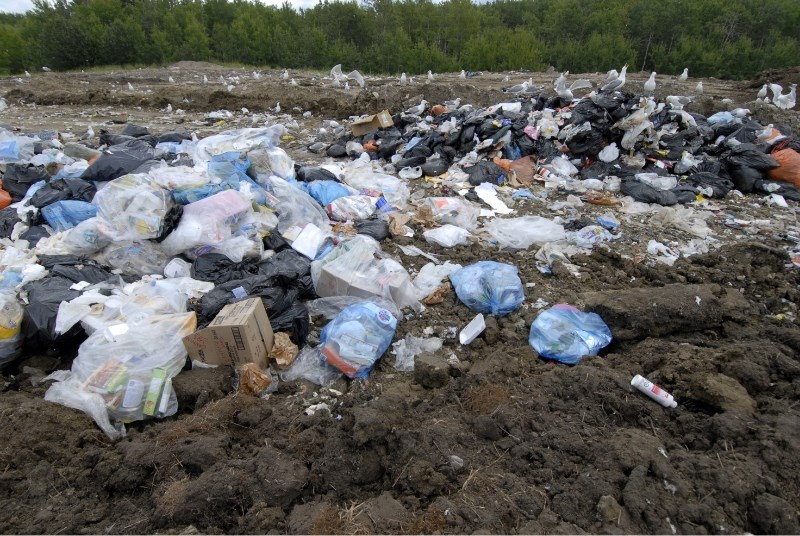After 20 years of discussion, planning and delay, the time has finally come to pull the trigger on the Lac La Biche County solid waste transitional plan, and the first phase came into effect two weeks ago when County launched their curb-side garbage and recycling pickup.
“We’ve studied this solid waste plan to death,” said Barry Kolenosky, general manager of operations with the county. “Now we’ve got to deal with it. It’s time.”
The curb-side pickup is just the beginning in a long and important series of steps to create a better waste footprint within the municipality, said Kolenosky.
Under pressure from the provincial government to meet the parameters, codes and practises required in modern waste disposal, the county passed the solid waste transitional plan in January. For years, Lac La Biche has been disposing of waste the old fashioned way: essentially dumping it in a hole and capping it with dirt. Unfortunately, all of the county’s seven landfills are nearing extinction—full capacity—with Rich Lake already completely tapped out. .
The transitional plan will see the replacement of landfills with transfer stations over the next three years, with the new curb-side recycling pick-up playing a large role in reducing the amount of solid waste to be loaded into trucks at the transfer station and delivered to remaining landfill sites.
“When you look at garbage,” Kolenosky said, “50 per cent is traditional organics—grass clippings, yard waste, food waste. This can be composted. Of the remainder, we think we can recycle 30 per cent, which leaves 20 per cent that we need to deal with.”
In phase one of the transitional plan—the new curb-side pick-up program—the county plans to reduce the amount of waste going into Lac La Biche’s already overtaxed landfills by recycling a large part of it—including chipping disposed wood for use in landscaping, and recycling concrete to be used in roadway construction. In the meantime, Lac La Biche County will be implementing the second phase of the transitional plan over the next three years: constructing transfer stations for trash and recycling where the old landfills used to be.
Kolenosky, who jokingly refers to himself as the “king of garbage,” has been studying the methods and practises of successful solid waste disposal programs wherever he goes.
“We’ve been busy studying this. Other communities are further ahead because they implemented earlier. We’re looking at the best practises of our neighbours. We want to have a program that people will use. It’s all about finding the right mix for our community.”
Kolenosky is looking at methods of composting for the disposal of organic waste at the transfer stations. Traditional composting won’t work in northern climates during the cold winter months, but there are other composting methods that will achieve the same result. A number of municipalities are “digesting” organic waste—a concealed unit composts the material, producing methane as one of the by-products, which goes right back into the natural gas stores that citizens pay good money for.
Kolenosky is looking at 24-hour community recycling stations open seven days a week, with the potential of wood and grass clipping pick-up.
“It’s all a work in progress,” he said. “It’s been a 20-year span planning this, and now we’re playing catch-up. We had to do a lot in a short span of time.”
CURB-SIDE PICK-UP FRUSTRATIONS
In a letter sent out to all participants in the curb-side pick-up program, Lac La Biche County Council admitted that the implementation of the program had been fast and furious, leaving many residents bemused. The letter encouraged users to visit the county’s website and Facebook page in order to learn details about the use of the garbage and recycling carts.
“The timelines were tight,” said Shadia Amblie, director of communications for Lac La Biche County, explaining that the new garbage disposal contract was awarded June 6 and the old garbage disposal contract ran out June 30.
“That’s how much time we had to roll it out. We want to explain to residents that we weren’t trying to force this on them—we had to implement it, otherwise people would have woken up on Thursday with no garbage pick-up.”
Both Kolenosky and Amblie admit that there are challenges to be faced in implementing the new system, and they welcome feedback from the public.
“The cart program is a work in progress,” Kolenosky stressed. “We know there are things we have to adjust to—long driveways for example. How do we deal with [the program] for seniors, or in the winter? That’s why we sent out the letter to anyone who has a cart. We require the public’s input on solid waste. We’re asking for feedback and we want feedback. We want a successful program in the end. We’ve just got to move this thing along. And yes, there will be challenges that we’ll have to adjust to on the fly.”
As to the program’s cost, Amblie pointed out that the new program only costs $4 more a month than the previous plan, for those who had service in the hamlet—$19 as opposed to $15—and Kolenosky stated that some communities are charging $30 to $31 a month.
“We’re heading in the right direction,” Amblie said. “This is definitely a way to sustain and protect our environment. At the same time, we want to encourage a culture shift in the way people manage their solid waste and recycling. We see this as an opportunity.”
Kolenosky agreed, though his assessment had more to do with expediency than the environment. “It’s time,” he said simply. “You have to do these things.”



